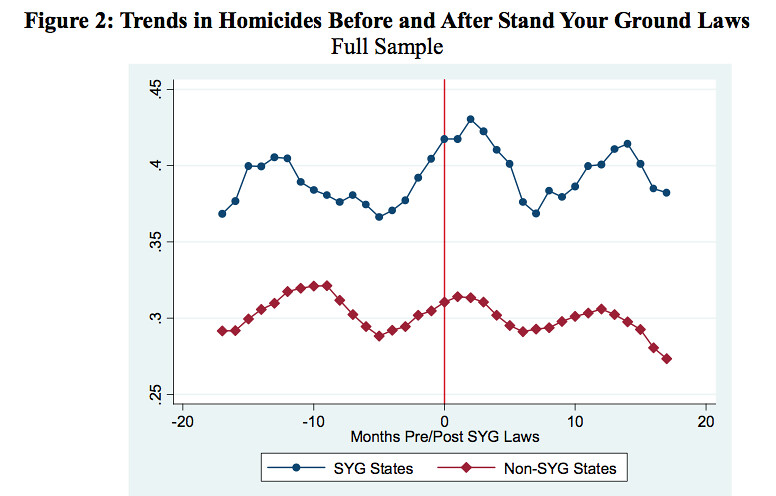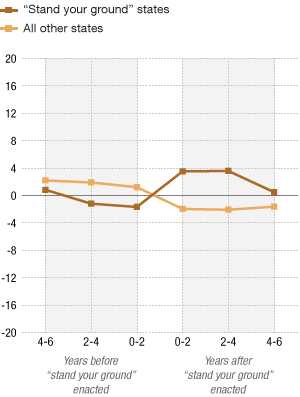
Since the shooting death of 17-year-old Trayvon Martin by George Zimmerman and Zimmerman’s subsequent acquittal, the focus on Florida’s Stand Your Ground law has not waned. Every time another case reaches the media, the debate flares up again with some people asserting such laws lead to more violence, while others say it helps victims protect themselves. The recent trial of Michael Dunn for opening fire on an SUV of four teens and the death of 17-year-old Jordan Davis has incited the argument once again. Dunn was convicted of attempted second-degree murder for shooting into the SUV, but the jury deadlocked on the murder charge against him for Davis’ death.
Florida’s Stand Your Ground law has been the subject of debate since it passed in 2005. The Florida Statute 776.013(3), or Stand Your Ground, expanded Floridian’s right under the Castle Doctrine to protect themselves against threats in their own homes, apartments or other dwellings using force to most anywhere they were lawfully permitted to be such as parks, streets and other public places, as long as the citizen is not engaged in unlawful activity themselves. Under Stand Your Ground there is no responsibility to retreat or avoid conflict, so force or even a threat of force, may be met with force if the Floridian reasonably believes it is necessary to prevent bodily harm, death, or the commission of a forcible felony, including robbery, sexual battery or murder. Florida was the first of now 23 states to pass a stand your ground law.
“Whether it’s trick-or-treaters or kids playing in the yard of someone who doesn’t want them there or some drunk guy stumbling into the wrong house,” Miami Police Chief Timoney told the New York Times when the law passed. “You’re encouraging people to possibly use deadly physical force where it shouldn’t be used.”
In a study by Mark Hoekstra and Cheng Cheng of Texas A&M it was found that states that had passed some form of a Stand Your Ground law had an 8 percent net increase in the number of reported murders and non-negligent manslaughters. The study claimed that the laws lowered the expected legal cost of using lethal force, while heightening the danger associated with committing a violent act, since the victim is more likely to become violent and lethal results are more likely. The study did not find that the laws deterred crime in any way.
This study analyzed state-level crime data from 2000-2010 and compared the crime numbers in the states before and after they passed Stand Your Ground laws. The states with Stand Your Ground crime numbers were also compared to the crime numbers of states that did not have such laws.

in states that don’t have the laws. The vertical y-axis represents an adjusted homicide
rate that takes into account a state’s population, pre-existing crime trends and other
factors.
“We also find evidence to suggest that the SYG laws are associated with increases in both justifiable and nonjustifiable homicides,” Georgia State University economists Chandler B. McClellan and Erdal Tekin wrote in their analysis of Stand Your Ground laws.
In Florida, the National Rifle Association lobbied for the creation of the Stand Your Ground law, arguing that it would protect Floridian’s right to defend themselves and ultimately deter criminals.
“It’s a clear position that we will stand with victims of violent attacks when the law is in their favor,” Republican Representative Dennis K. Baxley of Ocala, who sponsored the bill in 2005, said. “People want to know we stand on the side of victims of crime instead of the side of criminals.”
The New College Take
“Our advice [at NCF] of course is to avoid confrontation at all cost,” NCF Police Officer Wes Walker said. “Why let things snowball and possibly get out of control? Call us, we can get housing involved too.”
At New College there are instances where students feel threatened or unsafe due to the blurry nature of private space at a public university.
“A couple weekends ago, some people tried climbing over my balcony,” first-year Ariel Ward said. “When I confronted them they said they were third-years and it was their right to jump over our balcony and go into our room, and that’s not ok.
Although Ward explained multiple events where people hopped onto her balcony or came in her room without her permission, she said she would be hesitant to use force, since the trespassers would most likely be New College students who were being rude, but not violent.
“I carry pepper spray because I have been in situations were I felt threatened and my family encourages me to do so,” second-year Kim Napoline said. “I would use it at NCF, but the situation would have to be extreme … I would have to be being held down or attacked.”
“There are so many options available to people that we don’t have to get into [violence],” Walker said. “But if you are the victim of somebody breaking into your apartment or trying to physically harm you, don’t hesitate to use force. But it’s got to be reasonable and it can’t exceed the amount of force that is necessary to stop an attack … It’s not a license to use any amount of force.”
There have not been any cases that would fall under the Stand Your Ground law at NCF.
